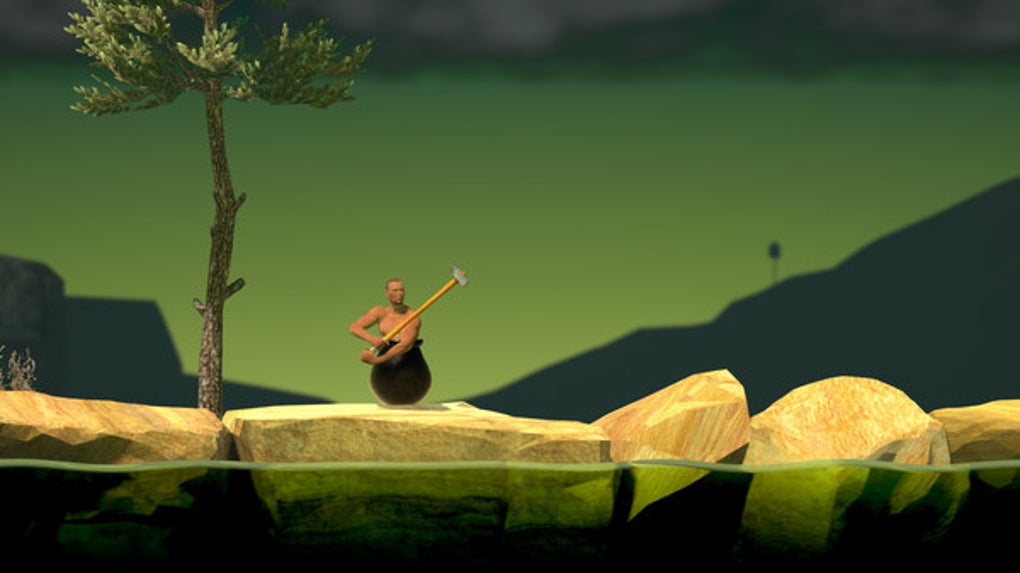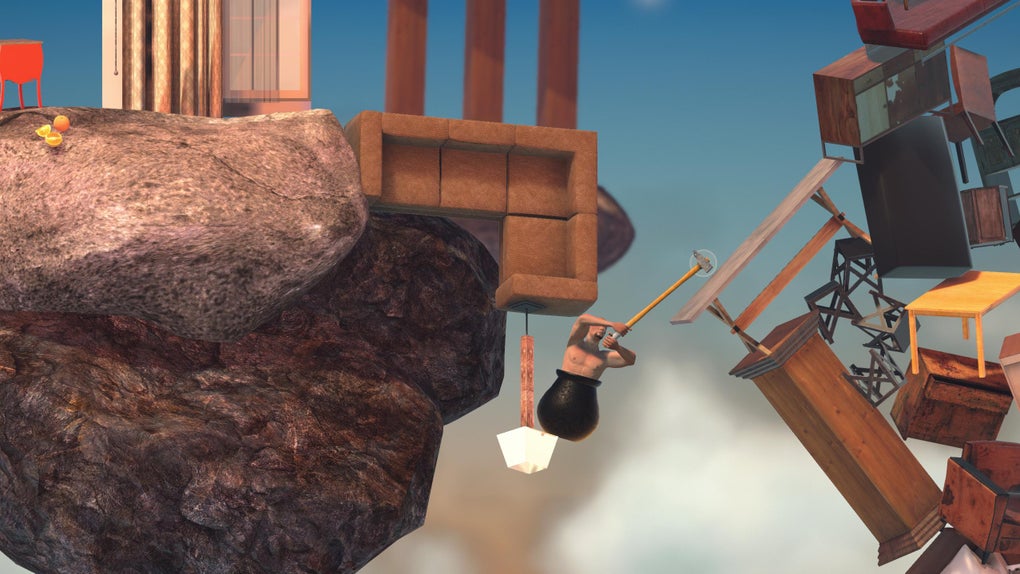Getting Over It with Bennett Foddy is not your average video game. It’s a challenging, often infuriating, and undeniably memorable experience that blends frustratingly realistic physics with surprisingly insightful philosophical commentary. Developed by Bennett Foddy and Noodlecake Studios, this satirical arcade platformer catapulted itself to viral fame, not for its stunning graphics or groundbreaking gameplay mechanics, but for its unique ability to push players to their limits of patience and perseverance. This isn’t a game you play for a quick win; it’s a journey of self-discovery, albeit one paved with repeated failures and the constant, often sarcastic, voice of its creator.
The Agonizing Ascent: Gameplay and Mechanics
The game’s premise is deceptively simple: climb a mountain. Your tool? A rusty hammer attached to a pot containing a rather disgruntled, Diogenes-esque protagonist. The mechanics, however, are anything but simple. Movement is controlled entirely by the mouse or touch controls, used to swing the hammer and propel the player upwards. Latching onto precarious ledges and navigating the treacherous terrain requires precise control and an almost intuitive understanding of the game’s physics. There are no tutorials, no hand-holding, just you, the hammer, and the unforgiving slopes.
The lack of hand-holding is deliberate. Foddy has openly stated that the game is designed to force players to confront their frustrations head-on. Each slip, each tumble back to the bottom, is a visceral lesson in patience and the acceptance of failure. The mountain itself is a symbolic landscape, littered with consumerist trinkets and absurdist obstacles, further enhancing the game’s satirical and philosophical undertones. The seemingly simple act of climbing becomes a metaphor for life’s struggles, highlighting the constant setbacks and the inevitable moments of self-doubt that accompany any meaningful pursuit.
The difficulty isn’t simply high; it’s intentionally brutal. One misplaced swing of the hammer can send you plummeting hundreds of feet, erasing minutes—even hours—of painstaking progress. This isn’t about skillful dexterity, but rather the slow, arduous process of learning the game’s nuanced physics through trial and error. You don’t solve puzzles; you conquer the physics engine. It’s a process that can be both maddening and strangely rewarding. The sense of accomplishment that comes with finally overcoming a particularly difficult section is amplified by the sheer amount of effort it took to reach that point.

Bennett Foddy’s Voice: A Constant Companion (and Critic)
Adding another layer to the experience is Bennett Foddy’s own voice, providing constant narration throughout the game. His commentary isn’t just background noise; it’s an active participant in the player’s journey, offering a mix of encouragement, philosophical musings, and often self-deprecating humor. His words often reflect the player’s own emotional state, transforming frustration into a shared experience. The bluesy soundtrack further complements this, underscoring the emotional rollercoaster of the gameplay.
Foddy’s narration touches on themes of perseverance, failure, and the meaning of life, often contrasting sharply with the seemingly simple act of climbing a mountain. His quotes, snippets of wisdom, and observations on the human condition are interwoven with the gameplay, creating a unique and thought-provoking experience. The constant stream of commentary is a distinctive element, simultaneously enhancing the isolation and fostering a sense of community among players who share their struggles and triumphs online.

This commentary is not simply inspirational; it’s often darkly humorous and self-aware, acknowledging the game’s inherent frustration. It’s a constant reminder that progress is not linear, and that setbacks are an inevitable part of the journey. The voice acts as a paradoxical companion – mocking the player’s failures while subtly offering encouragement and validation. The combination of grueling gameplay and cynical yet insightful narration results in an unusual, almost uncomfortable, bonding experience.
A Minimalist Aesthetic with Unexpected Depth
The game’s art style is purposefully minimalist. The graphics are simple, but effective. The intentionally low-poly style and limited color palette enhance the game’s overall tone, emphasizing the focus on gameplay and narrative over visual spectacle. The environment itself, with its bizarre collection of objects, contributes to the game’s surreal atmosphere and enhances its satirical commentary on consumerism. While not visually striking in the traditional sense, the minimalist design has fostered meme potential, further contributing to the game’s lasting appeal.
The Community Forged in Frustration
Perhaps the most surprising aspect of Getting Over It is the thriving online community it spawned. The shared experience of frustration and the eventual triumph over the game’s challenges has created a strong bond among players. YouTube is filled with playthroughs, showcasing both hilarious failures and eventual victories. Forums and online communities are buzzing with strategy tips, shared experiences, and commiseration over particularly difficult sections. This unexpected community building aspect highlights the power of shared struggle and the unifying nature of overcoming seemingly insurmountable odds.

A Game Not for Everyone: The Price of Perfection
Despite its unique appeal, Getting Over It with Bennett Foddy is not a game for everyone. The unforgiving difficulty and the repetitive nature of the gameplay might prove too frustrating for some players. The lack of any alternative gameplay modes or levels can also be a significant drawback. The game’s intense focus on patience and perseverance makes it a rather niche title, likely appealing most to those seeking a uniquely challenging experience with a strong narrative core, rather than a casual gamer looking for light entertainment. The game’s difficulty is its defining feature; a feature that will either enthrall or repel, depending on the player’s tolerance for frustration.
A Lasting Legacy: More Than Just a Game
Despite its limited scope and challenging gameplay, Getting Over It with Bennett Foddy has achieved a lasting legacy in the gaming world. Its unique blend of challenging mechanics, insightful narration, and minimalist aesthetic has resonated with a dedicated audience, fostering a sense of community built around shared struggle and eventual triumph. While it may not be a game for everyone, its impact on the gaming landscape is undeniable, proving that a truly memorable experience doesn’t necessarily require cutting-edge graphics or complex gameplay systems. The game’s enduring popularity is a testament to the power of a simple idea, executed with brilliant ingenuity and a healthy dose of self-aware, dark humor. The journey may be painful, but the climb, and the resulting view from the summit, are certainly unforgettable.
File Information
- License: “Full”
- Version: “2017”
- Latest update: “March 26, 2025”
- Platform: “Windows”
- OS: “Windows 8.1”
- Language: “English”
- Downloads: “299.7K”
















